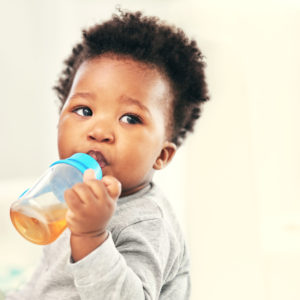Dentist in Allentown Discourages Giving Juice to Children Under One
June 22, 2017
 Throughout the years, you will always hear a diversity of parenting advice. What was good for your child last year suddenly becomes taboo tomorrow. As a result, it is easy to ignore the ever-changing recommendations. However, a new piece of information about your child’s dental health has been brought into the light and you do not want to ignore it. While it was considered safe in the past, it is discouraged that children under the age of one drink juice. Not only does it increase your child’s risk for weight gain, but can also lead to tooth decay. As your dentist in Allentown, Dr. Eric Marsh has the information you need to protect your child’s teeth.
Throughout the years, you will always hear a diversity of parenting advice. What was good for your child last year suddenly becomes taboo tomorrow. As a result, it is easy to ignore the ever-changing recommendations. However, a new piece of information about your child’s dental health has been brought into the light and you do not want to ignore it. While it was considered safe in the past, it is discouraged that children under the age of one drink juice. Not only does it increase your child’s risk for weight gain, but can also lead to tooth decay. As your dentist in Allentown, Dr. Eric Marsh has the information you need to protect your child’s teeth.
Why Is Juice Bad for the Teeth?
Many parents give their children juice with the belief that it is healthy. However, you might be surprised to learn that it does not offer any nutritional benefits to children under the age of one. In the past, the American Academy of Pediatrics supported giving juice to children after the age of six months. Now, they have changed their recommendations, advising not to give it until after their first birthday.
Fruit juice contains a large amount of sugar, which is associated to causing weight gain. However, it negatively impacts dental health as well. Children under the age of one still often drink from a bottle, causing the teeth to be bathed in the sugars, leading to cavities. The risk for serious decay further increases if the child sleeps with the bottle.
Tooth decay in infants is known as “baby bottle rot.” This occurs when sweetened liquids, such as juice, cling to the infant’s teeth for a long time. Oral bacteria then turn the sugar to acid, eating away at the enamel. While drinking juice from a bottle at any time increases their risk for decay, it is especially high if they take a bottle to bed because saliva production decreases while sleeping.
Although any teeth can be affected by baby bottle rot, it typically occurs with the upper front teeth. Often, the decay can go undetected, allowing it to progress in severity. As a result, before their first birthday, your infant could require extensive dental work.
If the baby teeth become too significantly damaged, they can be lost too early from decay or infection. With the primary teeth vital to learning how to chew and speak correctly, the loss of them can cause serious developmental challenges. Not to mention, the adult teeth can end up negatively impacted as well.
How Can I Protect My Infant’s Teeth?
Although the baby teeth eventually fall out, they still require care. As soon as the first tooth erupts, brush their teeth twice a day and schedule an appointment with your family dentist in Allentown for a cleaning and checkup. Provide a healthy diet that does not include juice, and do not let them sleep with a bottle or sippy cup. As soon as possible, transition your child to a traditional glass.
If your child is ready for their first visit to the dentist, contact our office today to schedule an appointment.
No Comments »
No comments yet.
RSS feed for comments on this post.
